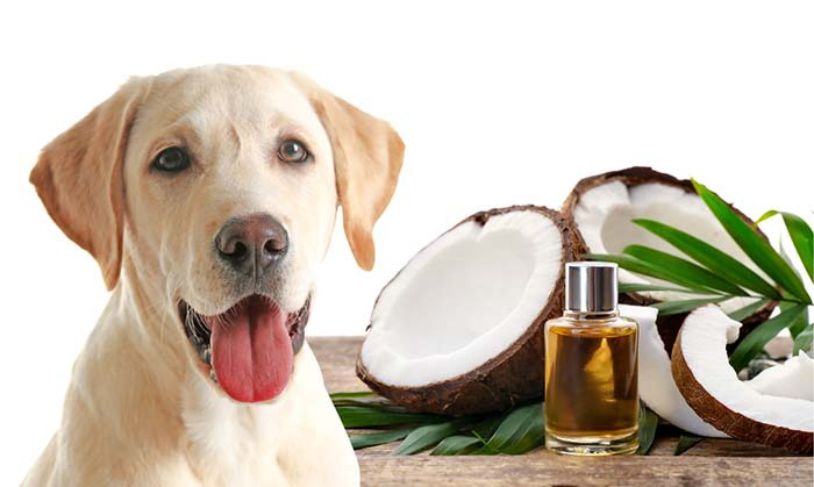If your dog is on a commercial dry kibble diet or on a self-designed home cooked dog food, then your dog may not be getting all the nutrition that is essential for a long and healthy life. This imbalanced dog food diet, when fed over a long period of time, will lead to nutrition and health related issues in dogs like cancer, arthritis, inflammatory diseases, unhealthy skin and poor fur quality.
One of the main reasons of skin issues in dogs, like allergies, dull coat, flaking and excessive shedding, is due to an imbalance of omega-3 and omega-6 fatty acids in the dog food that your dog eats. Supplementing the dog food with the right kind of oil, in the right quantity, will reduce many of these problems.
If you notice that your dog’s fur looks dull and sheds a lot then it is time to add some healthy oils to the dog’s food bowl. Making oil a part of your dog’s daily diet plan will help reduce many health-related issues in your dog. Natural Oils for dogs are the safest and most effective way to improve your dog’s skin and fur quality
There are many commercial supplements also available in the market. However, if you chose the right oil and add it to your dog’s daily diet plan, the results will be far better.

Here is a list of the Best Oils for Dogs and feeding guide to these oils. The oils that we are suggesting for your dog are a powerhouse of Omega-3 and Omega-6 fatty acids, which promote better health and longer life in dogs.
Fish Oil for Dogs
Your vet will most likely recommend Fish Oil for your dog at some or other point in their life. Fish oil is packed with two essential fatty acids, EPA and DHA. These fatty acids have cancer fighting properties and improves the cognitive abilities of your dog.
Fish Oil based omega-3 fatty acids also have a natural anti-inflammatory property and reduces pain caused due to inflammation in the body. That is why dogs who are suffering from arthritis and joint inflammations are recommended to add fish oil to their daily bowl of dog food.
Want you furry to have extra shiny coat? Then Fish Oil is the best oil for dogs to improve skin and fur. Fish Oil also reduces itchy skin, hot spots, dandruff, dry flaky skin and allergies.
So, if you want to improve your dog’s skin, fur, memory and prevent cancer while also reducing inflammation and joint pain, then do remember to pour some natural fish oil on their daily bowl of dog food.
You can get many different brands of fish oil in the market. Look for Fish Oil sourced from salmon, sardines, herring, tuna and other fishes that are classified higher in the food chain as they offer the most omega-3 fatty acids.
Once opened, store the fish oil in the refrigerator. Fish Oil goes rancid easily and once spoilt they are not effective and may also cause digestive issues. Fish oil also loses its efficacy if warmed. So, you should not cook fish oil and add it over the dog food at the time of serving.
Before including Fish Oil in your dog’s diet plan, check the label of the dog food that your dog eats regularly to make sure that it does not have fish oil added to it. Too much fish oil can cause upset stomach and blood thinning. An average dosage of fish oil for dogs is 1000mg per 30 pounds of body weight of the dog.
There are an overwhelming number of Fish Oils to choose from in the market, so how to decide which is the best fish oil for dogs? So here is quick overview of what to look for when choosing the best omega-3 fish oil for dogs.
Look at the label of the fish oil to check the ingredient list. The active ingredient that we are looking for in the fish oil for dogs is EPA and DHA. However, the brand of fish oil you chose for your dog will have other kinds of fatty acids too. Check the label to see the actual amount of EPA and DHA before buying the fish oil to supplement your dog’s diet.

Coconut Oil for Dogs
The benefits of coconut oil for dogs are well documented by now. Coconut oil is not just a popular choice of natural oil for humans but coconut oil is good for dogs too. In fact,coconut oil is one of the best oils to add to your dog’s food.
Dogs who suffer from digestive issues and have dry flaky skin benefit a lot by adding coconut oil to their diet. Coconut oil is also recommended for dogs who have stinky breath and it also helps in weight loss in dogs.

Flaxseed Oil for Dogs
Flaxseed Oil is an excellent natural oil that help dogs with allergies, mobility issues, arthritis, blood pressure, inflammation issues and kidney problems. High in alpha linolenic omega-3s, Flaxseed Oil is as good as Fish Oil in boosting heart health in dogs.
Flaxseed Oil is a great substitute to Fish Oil for dogs who are allergic to fish oil but still need help with mobility issues and inflammations.
Ground Flaxseed is a safe way to add the benefits of flaxseed oil to the dog food. High in fibre, Flaxseed powder will also improve the digestive health of your dog. 1/2tsp of Flaxseed Oil or ground Flaxseed per 30 pound of dog weight is the ideal dosage of Flaxseed Oil for Dogs. It is best to start small and then add gradually to reach the recommended amount.
FurrMeals Ready-to-Eat Fresh Dog Fo
od recipes are supplemented with Flaxseed Oil and ground Flaxseed to make sure that your furry gets all the amazing benefits that comes with the addition of this natural supplement.
Olive Oil for Dogs
Olive Oil also comes in our list of Best Oils for dogs. Olive Oil is knownfor building the immune system of dogs and helps dogs with diabetes and cardiovascular diseases.
Olive Oil is also one of the best oils for dogs with itchy skin. Add Olive Oil to your dog’s food bowl to keep their epidermal layer of the skin plump and well-hydrated. This gives their fur a healthy look and shine.
Applying Olive Oil on your dog’s skin and fur will also help to improve the skin and fur quality. However, be careful not to apply too much olive oil on your dog’s skin as it will make the skin greasy and promote bacterial and yeast growth on the skin.
How to Choose and Store Olive Oil for your dog?
Be careful of the kind of Olive Oil you choose for your dog. Choose extra virgin, cold pressed Olive Oil as it is the best olive oil for dogs.
Try avoiding the olive oils that are used for cooking purpose when substituting your dog’s food with olive oil as these variants are mixed with other ingredients, and some of them may not be suitable for your dog.
How much Olive Oil can I give to your dog?
The easiest way to add olive oil into the dog food is to drizzle some over the fresh dog food that you are giving your dog. A daily serving of 1tsp per 20 pound of body weight of your dog is the ideal dosage of Olive Oil for dogs.
Like many of the other oils, Olive Oil is also very unstable and must be stored carefully to increase its shelf life. Always store Olive Oil in a dark coloured bottle away from direct sunlight or any other heat source.
How do you know if you should add oil to the Dog Food?
Although, all dogs will benefit by the addition of healthy oils in their diet, but some dogs need it more than others. if your dog is on a particular dog food diet for some time and is suffering from skin allergies, itchy skin, dry-flaky skin or dull coat then you must supplement the dog food you are serving with a good oil for dogs. You should also look for alternative dog foods that have a better balance of nutrition.
In general, a balanced fresh dog food diet is always better than a dry commercial kibble diet because the nutrients in fresh dog food are more bio-available, is natural, chemical free, preservatives free and also keeps your dog better hydrated.
Oils are also good for dogs who are suffering from inflammatory diseases like arthritis, cancer or have some organ damage. These dogs need an extra helping of omega-3 and omega-6 in their diet and oils are some of the best sources of omega-3 and omega-6 for dogs.
As always, before adding any supplement to your dog’s diet, make sure to check with your veterinarian or a Canine Nutritionist. Most natural, fresh, wet dog food brands are already supplementing their meals with oils, so make sure to check that before adding any oil. If your furry is on a FurrMeals Fresh Dog Food diet, then no extra oil needs to added as the meals, unless your veterinarian has prescribed for the same.
Even the best oils for dogs can have negative effects on the body if you feed more than the recommended dosage. Adding too much oil in their diet can cause diarrhoea, weight gain, pancreatitis and vitamin deficiencies. Fish Oil also prolongs the process of blood clotting. So, if your dog is scheduled for surgery and then it is best to remove fish oil from your dog’s diet at least 5 days before surgery to avoid any complications due to delayed blood clotting.

